- Home
- Keith R. A. DeCandido
Tales from the Captain's Table Page 11
Tales from the Captain's Table Read online
Page 11
“Is she—?” I began.
Kittinger stood there, arms draped behind his back. I braced myself for grave news, and so was surprised when he said, “Believe it or not, it appears she’s going to pull through.”
“Well, that’s…” I stood, relief flooding through me. “That’s…amazing, I…”
“Elizabeth,” said Kittinger with that same grim tone, which I couldn’t understand considering that the news had been good. “Our physicians…they had to do a lot of work on Soleta, practically had to piece her innards together like a jigsaw puzzle…and they discovered…”
“What?” I said. “What did they…?”
“Soleta…she’s half-Romulan.”
And the first words that were about to leave my mouth were “I know.”
And I did know. Soleta had told me, ages ago. Back when we were both convinced that Mackenzie Calhoun was dead. She’d told me when it was just the two of us in a bar, and she was wondering just how dedicated I was to the principles of Starfleet as compared to the principles of friendship and trust. She had not known of her mixed heritage when she’d enlisted with Starfleet, but when she had learned of it, she had kept it to herself. And routine examinations did not turn it up since Vulcans and Romulans are so similar biologically.
Still, Starfleet regulations were quite clear that she should have made full disclosure, even though it would likely have cost her her starship assignment. Romulans were a known hostile race, and someone with perceived affiliations to them would never be allowed more than desk duty. She didn’t want that for herself. And I didn’t want it for her. I cared about the woman, not her genetics, and so kept her secret to myself, which was also in violation of Starfleet regs. Which essentially made me a co-conspirator in what was, to my eyes, a nonconspiracy.
But an instant before I opened my mouth, Soleta’s words slammed back to me. They’ll…crucify you…don’t tell them…swear you’ll say…you didn’t know…swear it…on your life…on Mac’s life…
And I’d sworn it. I’d given her my oath, sworn it, and realized that Soleta had seen this coming, and she’d also been aware that Starfleet might very well not see it as a nonconspiracy at all.
It took me a moment to realize that Kittinger was still speaking. “What?” I said, my mind still racing. “What…did you say…?”
“She dropped you with a nerve pinch, you said?” Kittinger inquired. When I managed a nod, he continued, “That left you helpless, you realize.”
“Helpless…?”
“Have you considered the possibility,” Kittinger continued, “that what she did wasn’t heroic at all? That she put you down so she could try to negotiate some sort of deal with the Orions that would benefit both them and the Romulans? And when the proposed deal went sour, she was suddenly just fighting for her own life?”
“That’s insane!”
“Is it?” he said, scratching his chin. “This opens up all sorts of possibilities. It would explain a lot of things, about difficulties the Excalibur has landed itself in…”
“Kitt, you are way off base here! There’s no way…no! Soleta was just determined to do it herself, that’s all. She didn’t want me out there risking myself, and was convinced she could…what you’re saying…it’s…no! I know her!”
“Do you?”
“Yes.”
“Did you know she was half-Romulan?”
Swear! Swear on Mac’s life! Swear it…they’ll crucify you! Swear!
“How could I possibly know that? Do you think she would have just told me?”
Kittinger half-smiled at that. “No. No, of course not.”
And that was that.
On that day…that day that Soleta almost died…I lost a part of myself. Not an arm or a leg. Not a limb.
No, a piece of my soul died that day. That day, attendant to my promise but also gut-wrenchingly afraid for my own career…I, who had thrown myself on a bomb to save a crewmate, backed away from another type of bomb and let it go off with me nowhere around.
Soleta recovered, only to face a hearing…a hearing that resulted in her leaving Starfleet for good. I testified on her behalf. I swore up, down, and sideways that I would be a prisoner of the Orions, or worse, if not for her. But their damned suspicions overrode everything I said, and everything Mac said in her favor as well, and Soleta left.
And recently, word has filtered through to me from Starfleet intelligence that Soleta has gone over to the Romulan Empire…that she now works directly with the Romulan praetor….
I don’t want to believe it. It is unthinkable to me. But really, we left her nowhere else to go. I know Soleta, and she is someone who needs a cause to be a part of. Someone to fight for. And if that cause is the side of her heritage that will accept her, then that is where she will be.
And so I sit here and think of what is to come. And I drink deeply, feeling the liquid burning within me. I feel for Soleta, the woman whom I was so slow to call friend, whom I now call rescuer, and whom I then willingly cut loose like a rotting extremity. And I think of the lost bit of my soul that I can still feel every now and then, ghostlike, accusing me in silence of failing to stand beside Soleta, even though it might have cost me my rank, my assignment, everything.
I try to tell myself there was no other choice while knowing that there are always choices.
And I get myself stinking drunk. Because it’s the only way I can think of to manage the pain.
Tending Bar…
Before long, Picard, Riker, and Shelby had all departed, Shelby somewhat unsteadily. Another human Starfleet captain came in, an older man with white hair and bushy eyebrows, but Cap knew that David Gold would not be drinking anything for quite some time.
Others came in as well, culminating in two more Starfleet personnel, a familiar human male and an unfamiliar Bajoran female. Cap knew that his place wasn’t to every captain’s taste, its ability to visually conform to the wishes of the patron notwithstanding, so it always did his heart proud to see a regular patron like Benjamin Sisko bring his friend and comrade Kira Nerys along when she made captain.
These two were different from Picard and Riker, though. Where Riker had taken to the place without hesitation, Kira seemed uncomfortable despite Sisko’s best efforts. They took their seats next to Klag, who had been sullen since Riker’s concert. Cap quickly brought the new arrivals their drinks. He welcomed Sisko back, and expressed his joy at Kira’s patronage. Sisko was all smiles, but Kira remained apprehensive.
Cap had faith in his place’s ability to knock down the walls, as it were.
He also noted that Klag’s warnog mug was almost empty….
Klag, Son of M’Raq
Captain of the I.K.S. Gorkon
loDnI’pu’ vavpu’ je
KEITH R.A. DECANDIDO
“Another warnog.”
Wiping his hand on the apron he always wore, Cap brushed a lock of unruly white hair out of his eyes. “That was your tenth warnog, Klag.”
“Eleventh, actually.” Klag snorted. “If this were truly the Klingon tavern that it appears to be, you would not be keeping track.”
Cap smiled wryly. Each captain who came through the establishment’s doors saw his or her own ideal watering hole, which in Klag’s case meant a public house within the Klingon Empire, the wooden walls covered with various edged weapons as well as the heads of trigaks, klongats, targs, and other game animals.
Klag continued: “And I’m still quite sober, as your transparent lie was obviously designed to test, so kindly give me another. I’m not nearly drunk enough yet.”
“Maybe, maybe not. But you know the rules, Klag.”
A Boslic freighter captain muttered, “Like a Klingon ever follows the rules.”
Slamming a fist into the bar, Klag whirled on the Boslic. “Klingons value the power of story far more than your mongrel race, woman!”
She smiled coyly. “Prove it. Tell us a story.”
“Oh no,” muttered a Bajoran solar sailboat master. “
Every time I come in here, it’s another Klingon story. They’re always about fighting and killing and honor.”
A human timeship captain chuckled. “They aren’t all like that—just the ones they tell in bars.”
Sneering, a Romulan outpost commander said, “Do Klingons ever do anything other than tell stories in bars?”
Another Klingon captain, sitting at the far end of the bar from Klag, said, “Yes—sometimes we defeat Romulans in battle.”
“Doesn’t matter,” Cap said before the Romulan could reply to the other Klingon’s insult. “Only rule in this place is that everyone who comes in tells a story, and Klag’s been here for eleven warnogs and several stories. It’s his turn.”
Klag let out a long breath that was half-sigh and half-snort. “Very well. I will tell you all a tale.” He gave the Bajoran a sharp look. “It is a tale of fighting—a tale of killing—and a tale of honor. During the Dominion War, I served on the I.K.S. Pagh as first officer to an honorless petaQ named Kargan. At the Marcan system—”
“Oh God, no,” the human timeship captain said. “Not that story again.”
“You told that story the last time you were in here,” a Chalnoth kill-ship captain said with a snarl.
A Ferengi DaiMon added, “And the time before that!”
“We’ve all heard it a thousand times,” a Telspong shipmaster said.
“And each time,” the Romulan said snidely, “the number of Jem’Hadar that you kill with but the use of one hand and a mek’leth increases. I believe it was two dozen the last time.”
As he poured Klag a twelfth warnog, Cap couldn’t help but smile. Klag told the story of his victory on Marcan V the first several times he came into the bar. It was a huge hit the first time, but less so with each subsequent telling. Cap silently agreed with his customers: It was time for Klag to spin a new yarn.
Klag took a long gulp of his drink, then turned toward the other patrons, who slowly quieted down. The dozens of conversations that made a wall of sound now faded into an equally solid wall of silence.
Once Klag had a captive audience, when the only background noise was the clunk of drink containers on tables, he began to speak.
“I am the firstborn son of M’Raq, and now the head of the House that bears his name. But M’Raq and his mate, my mother Tarilla, had a second son only one turn later: Dorrek.
“That year that separated our births was as nothing to us, however. We were as inseparable as twins, though we looked nothing alike. Dorrek inherited our mother’s crest, where mine matches that of our father. To look at us, you would not know we are of the same House, much less the same parentage—but to see us, anyone would know instantly that we were brothers.
“We learned to wield the bat’leth together. We mastered the d’k tahg together. We read together and studied all the great operas together.
“And we learned to hunt together.
“Our father’s uncle was a one-eyed old razorbeast named Nakri. As a youth, Nakri served under General Koord, and later was a warrior in the service of General Kerla. After losing his eye in battle against the Kinshaya, he left the Defense Force and became a professional hunter. For seven years running, he won the competitions on Zakorg.”
A Triexian transport captain asked, “What’s Zakorg?”
The Romulan said, “A planet in the Klingon Empire, obviously—where they no doubt hold idiotic contests in outmoded activities.”
Klag smiled. “I would expect a veruul such as yourself to characterize the hunt as ‘outmoded,’ Commander.”
Cap wondered if the Romulan would respond to the insult, but he seemed more taken aback by Klag’s use of a Romulan curse than by the insult itself.
Klag turned to the Triexian. “However, he is essentially correct. Zakorg is the home of the finest preserve in the empire, and only the greatest hunters are even allowed to apply to compete there.
“Once, when I was six and Dorrek five, we were sent to live with our great-uncle for a season. Father was serving in the Defense Force, and Mother was recovering from an illness. It was their wish that Nakri teach us how to hunt properly. At the time, I had thought the notion absurd. We had both participated in the hunt, and each of us had taken down targ cubs and a few ghISnar cats—not worthy of an adult, of course, but as good as our peers.
“The first thing Nakri said when we arrived at his estate in the Talthar Highlands was ‘I have seen your hunts, children. You are both fools and incompetents. I am embarrassed to call you kin.’
“We were outraged, with the petulance that only children can achieve, and tried unsuccessfully to defend our honor.
“ ‘None of the others in our class were able to bring down any targ cubs!’ I wailed.
“ ‘And our ghISnar cats were the biggest ones!’ Dorrek cried.
“Nakri laughed at us. ‘And is this record of battle supposed to impress me? I can train a Pheben to hunt down a ghISnar cat.’
“ ‘Our instructor—’ I started, but Nakri laughed again.
“ ‘I know your instructor. He is a lying toDSaH who fools his students into believing that small accomplishments are other than that.’
“ ‘Other than what?’ Dorrek asked.
“ ‘Small. You are warriors! You are the sons of M’Raq! You are of noble blood, not common children whose deeds are to be measured against the unworthy.’ He fixed each of us with a one-eyed glare that would make Chancellor Martok envious. ‘Starting tomorrow, I will teach you. You will leave this place one of two ways. One is as the best hunters on Qo’noS.’
“He was silent for several seconds. Looking back, I know now that he was testing our patience, seeing how long it would be before we would speak out of turn. Being a youth, it was not especially long before I blurted out, ‘What is the second way?’
“He smiled. His teeth were sharper than the finest tik’leth blade, and when he bared them, I knew a fear like nothing I’d ever felt in my six years.
“ ‘Dead—with dishonor—at the hands of an animal.’ ”
“Wait a minute,” the Triexian said, “he would’ve killed you?”
Again, Klag smiled. “No—our prey would, if we failed. That was the challenge Nakri put before us.”
The human timeship captain glowered at the Triexian. “Are you going to keep interrupting, or are you going to let him tell it?”
Putting up all three hands defensively, the Triexian muttered, “Sorry.”
Klag took advantage of the distraction to swallow the rest of his warnog. Cap, anticipating his need, had his thirteenth ready for him before he put the mug down. Giving the bartender a nod of acknowledgment, Klag continued his story:
“The next morning, we were awake before the sun.
“We had been taught how to distinguish the scents of different types of beasts—Nakri taught us how to tell the specific breeds and genders apart. Once we could only tell a bird from a reptile. Now, we could tell a ramjep from a taknar, a wam serpent from a ghIq, and a male targ from a female targ.
“We had been taught to be aware of shifts in the wind—Nakri taught us how to read the signs that indicated that the wind would shift, or that it wouldn’t.
“We had been taught to aim for the heart, regardless of the animal—Nakri told us the folly of such an approach, as the hunt was truly to procure food, and the hunter was best served by limiting the damage to the portions of the animal that were not eaten, such as the head and the neck.
“We had been taught to throw small spears—Nakri taught us how to get in close with our d’k tahgs.
“Once, I tried to convince him to let us hunt with a bat’leth. Before coming to Nakri’s, we had both participated in a Young Warriors Bat’leth Tournament, in which we came in first and second.”
“Which one of you came in first?” the Boslic woman asked.
Cap smiled, even as Klag’s facial expression soured.
“That year, Dorrek did. But the previous year, it was I who triumphed. In any event, Nakri refused to
let us hunt with those weapons, despite our proficiency. ‘The bat’leth was Kahless’s sword,’ he told us. ‘It is to be used only by those who are worthy. You are not.’
“After many weeks, however, Nakri decided that we were worthy. He declared that we would hunt on our own—with bat’leths. We were sent out into the grounds before dawn to find targ and bring it home in time for the midday meal. Armed with our d’k tahgs and our bat’leths, we went forth.
“For hours we searched, trying to scent a targ, but smelled only smaller, weaker prey. Nakri had sent us deeper into his estate than we had ever gone before. His lands were in a huge valley in Talthar, and this hunt brought us very close to the mountain face. Targ do not climb mountains, so if we did reach the base of the peak, we would find nothing.
“Then Dorrek caught wind of a klongat.” Turning to the Triexian, Klag added, “Before you ask, a klongat is a huge beast, the size of an adolescent Klingon, with immense strength, razor-sharp claws, and a vicious temper.
“When I too caught the scent, the first words out of my mouth were ‘We should try to bring it down.’
“Dorrek sniffed the air. ‘It smells very large, brother. And Nakri has forbidden us to hunt anything so large on our own.’
“I laughed. ‘We are not on our own, brother—we are together.’ Remembering Nakri’s words from our first day, I added, ‘We are the sons of M’Raq. Is there anything we cannot do?’
“ ‘If there is,’ Dorrek said, ‘we have not yet encountered it.’
“ ‘Exactly. I am sure that, if one of us did try to hunt the klongat on our own, that one would die. But we are together—we are strong.’
“ ‘But, Klag—’
“I could see that my brother had not yet found his resolve. I removed the bat’leth from my back scabbard, and held it aloft proudly. ‘I am the older brother, Dorrek. When Father is away, I lead our House. We will hunt this beast.’ Slapping him on the back with my other hand, I said, ‘Do not worry, brother—we shall subdue the creature with little difficulty.’

 Alien
Alien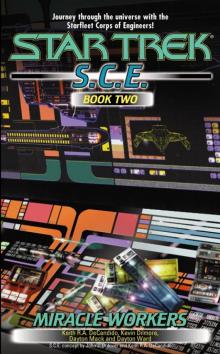 Miracle Workers
Miracle Workers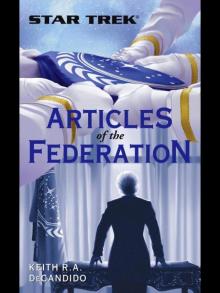 Articles of the Federation
Articles of the Federation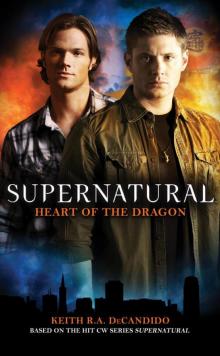 Supernatural Heart of the Dragon
Supernatural Heart of the Dragon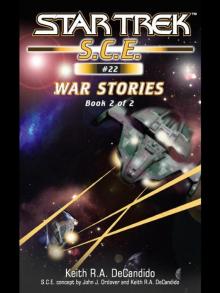 War Stories: Book Two
War Stories: Book Two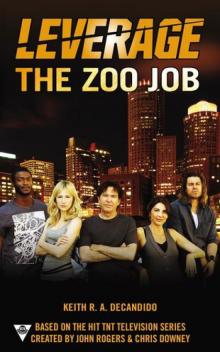 The Zoo Job
The Zoo Job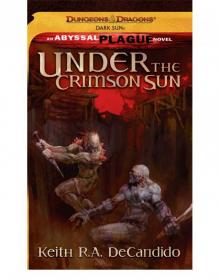 Under the Crimson Sun
Under the Crimson Sun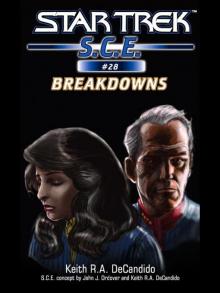 Breakdowns
Breakdowns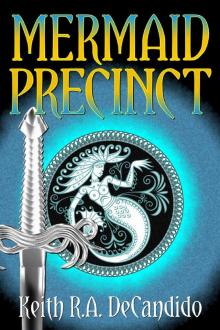 Mermaid Precinct (ARC)
Mermaid Precinct (ARC)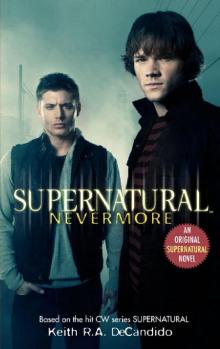 Supernatural 1 - Nevermore
Supernatural 1 - Nevermore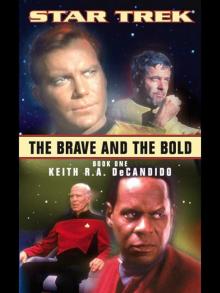 STAR TREK - The Brave and the Bold Book One
STAR TREK - The Brave and the Bold Book One Four Walls
Four Walls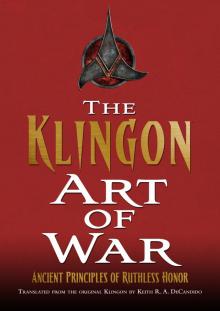 The Klingon Art of War
The Klingon Art of War Blackout
Blackout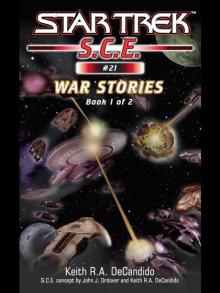 War Stories: Book One
War Stories: Book One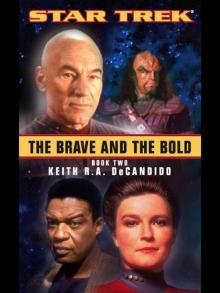 The Brave and the Bold Book Two
The Brave and the Bold Book Two Honor Bound
Honor Bound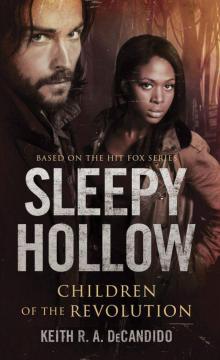 Sleepy Hollow: Children of the Revolution
Sleepy Hollow: Children of the Revolution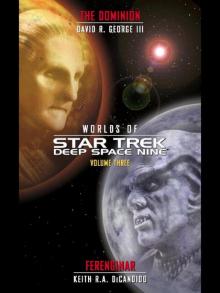 Worlds of Star Trek Deep Space Nine® Volume Three
Worlds of Star Trek Deep Space Nine® Volume Three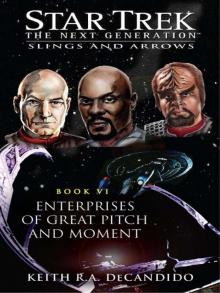 Star Trek: TNG: Enterprises of Great Pitch and Moment
Star Trek: TNG: Enterprises of Great Pitch and Moment Genesis
Genesis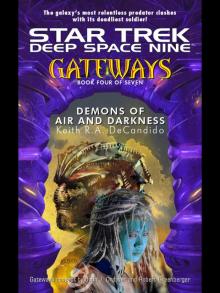 Demons of Air and Darkness
Demons of Air and Darkness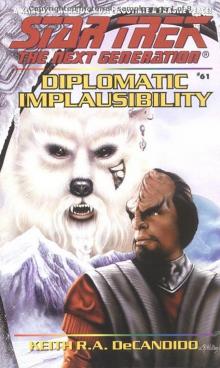 Star Trek - TNG - 61 - Diplomatic Implausibility
Star Trek - TNG - 61 - Diplomatic Implausibility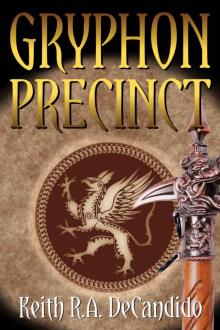 Gryphon Precinct (Dragon Precinct)
Gryphon Precinct (Dragon Precinct)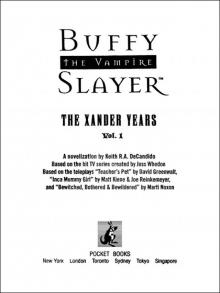 THE XANDER YEARS, Vol. 1
THE XANDER YEARS, Vol. 1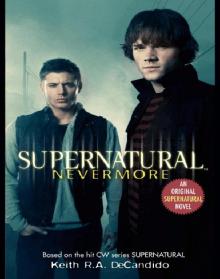 Nevermore
Nevermore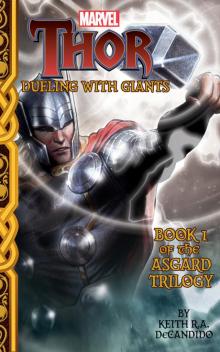 Thor
Thor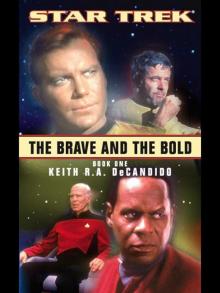 The Brave And The Bold Book One
The Brave And The Bold Book One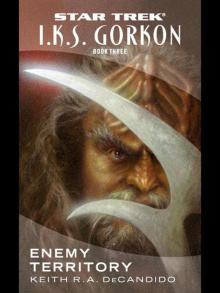 I.K.S. Gorkon Book Three
I.K.S. Gorkon Book Three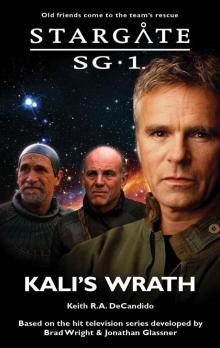 STARGATE SG-1: Kali's Wrath (SG1-28)
STARGATE SG-1: Kali's Wrath (SG1-28)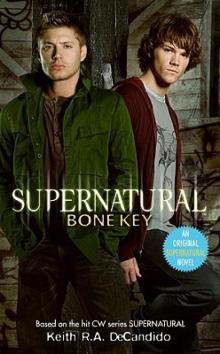 Bone Key
Bone Key Guilt in Innocece
Guilt in Innocece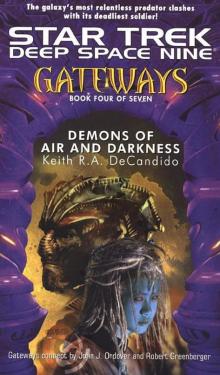 Star Trek - DS9 Relaunch 04 - Gateways - 4 of 7 - Demons Of Air And Darkness
Star Trek - DS9 Relaunch 04 - Gateways - 4 of 7 - Demons Of Air And Darkness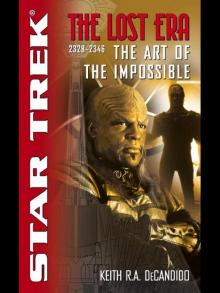 The Art of the Impossible
The Art of the Impossible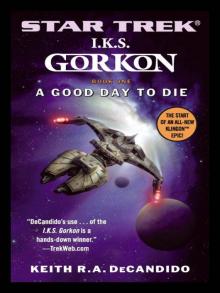 I.K.S. Gorkon Book One: A Good Day to Die
I.K.S. Gorkon Book One: A Good Day to Die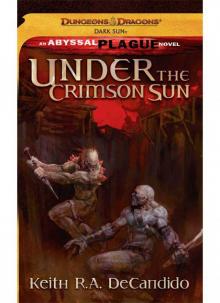 Under the Crimson Sun (the abyssal plague)
Under the Crimson Sun (the abyssal plague)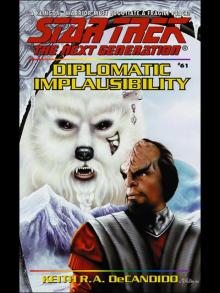 DIPLOMATIC IMPLAUSIBILITY
DIPLOMATIC IMPLAUSIBILITY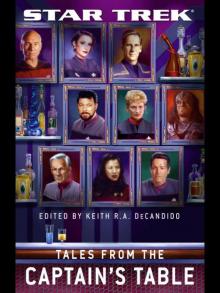 Tales from the Captain's Table
Tales from the Captain's Table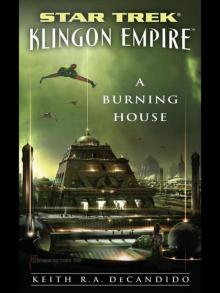 A Burning House
A Burning House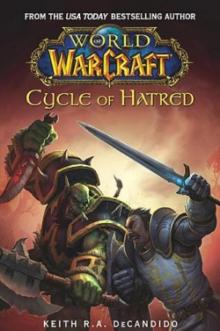 Cycle of Hatred (world of warcraft)
Cycle of Hatred (world of warcraft)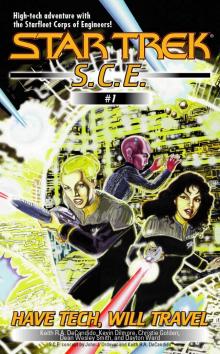 Have Tech, Will Travel
Have Tech, Will Travel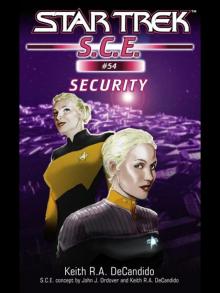 Security
Security